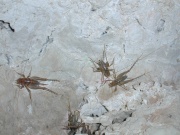Invertebrates (Inventory)/Crickets/C. conicaudus
From LagWiki
(Difference between revisions)
(Work on the text a bit) |
(A bit more) |
||
| Line 2: | Line 2: | ||
The '''C. conicaudus''' field should be used to record stations where the ''ceuthophilus conicaudus'' species of cave camel cricket is observed. | The '''C. conicaudus''' field should be used to record stations where the ''ceuthophilus conicaudus'' species of cave camel cricket is observed. | ||
| - | ''C. conicaudus'' can be identified by an interrupted pattern on the legs with distinct spikes. Some say it looks like they are wearing argyle stockings. ''C. conicaudus'' is less cave adapted than ''[[Invertebrates (Inventory)/Crickets/C. longipes|c. longipes]]''; but, moreso than ''[[Invertebrates (Inventory)/Crickets/C. carlsbadensis|c. carlsbadensis]]''. | + | ''C. conicaudus'' can be identified by an interrupted pattern on the back and legs with distinct spikes. Some say it looks like they are wearing argyle stockings. ''C. conicaudus'' is less cave adapted than ''[[Invertebrates (Inventory)/Crickets/C. longipes|c. longipes]]''; but, moreso than ''[[Invertebrates (Inventory)/Crickets/C. carlsbadensis|c. carlsbadensis]]''. |
They have been found in Spider Cave and a few in Left Hand Tunnel but they could be found anywhere. | They have been found in Spider Cave and a few in Left Hand Tunnel but they could be found anywhere. | ||
Revision as of 13:10, 18 August 2011
The C. conicaudus field should be used to record stations where the ceuthophilus conicaudus species of cave camel cricket is observed.
C. conicaudus can be identified by an interrupted pattern on the back and legs with distinct spikes. Some say it looks like they are wearing argyle stockings. C. conicaudus is less cave adapted than c. longipes; but, moreso than c. carlsbadensis.
They have been found in Spider Cave and a few in Left Hand Tunnel but they could be found anywhere.
They are usually slow moving and can be seen on the walls, floor or breakdown. Observe closely and carefully to see them as they can sometimes be found in small cracks or vugs.
See also
References
- Pate, Dale. Canyons & Caves; Issue No. 20; Spring 2001; Cave Crickets [1]

